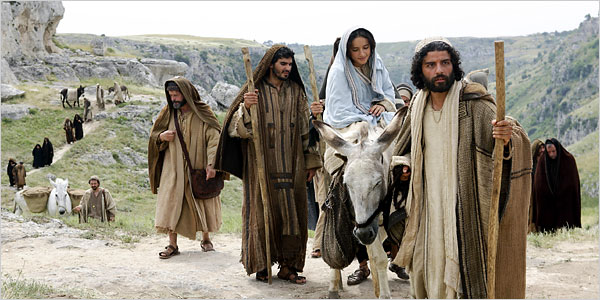'Full' list of Noah and the Ark films
%20inside%20ark.jpg) The above still is from Ermanno Olmi's Genesi: La creazione e il diluvio (Genesis: Creation and Flood, 1994) part of The Bible Collection.
The above still is from Ermanno Olmi's Genesi: La creazione e il diluvio (Genesis: Creation and Flood, 1994) part of The Bible Collection.
Many years ago I posted a "full list" of Adam and Eve films though it's perhaps not as complete as I thought it was back then. Nevertheless, given I'm looking at Noah films at the moment, I thought it was about time I posted a similar list of films about the flood and Noah.
I've restricted these to films which either try and tell the story set in the ancient world, or that are offering a direct modernisation. That means I'm excluding films like Peter Weir's The Last Wave (1977) which offer modern parallels, but not explicitly, or Moonrise Kingdom (2012) which draw on the imagery and meaning, but aren't really 'doing the story' so to speak. Due to the short amount of material available I am including films where the Noah segment is only a significant part of a longer movie. I have included a couple of documentaries with dramatised sections, but I'm not sure about those. I might take them out later!
I'll be adding to this as I go along over the next few weeks, but for now, here's the list:
• The Tale of the Ark (dir. Arthur Melbourne Cooper, UK: 1909)
• The Deluge (dir. Richard Strauss, USA: 1911)
• Photoplay of Creation (dir. Charles Taze Russell, USA: 1914)
• La Sacra Bibbia (dir. Armando Vay & Piero Antonio Gariazzo, Italy: 1920)
• The Bible: The Deluge (dir. Rev Harwood Huntington & Edgar J Banks, USA: 1922)
• The Bible: Noah and the Ark (dir. Rev Harwood Huntington & Edgar J Banks, USA: 1922)
• Noah's Ark (dir. Michael Curtiz, USA: 1928)
• Amateur Night on the Ark (dir. Paul Terry, USA: 1923)
• Noah's Lark (Dave Fleischer, USA: 1929)
• Father Noah's Ark (dir. Wilfred Jackson, USA: 1933)
• Deluge (dir. Felix E. Feist, USA: 1933)
• Noah (BBC) (dir. André Obey, UK: 1946)
• The Green Pastures (dir. Marc Connelly & William Keighley, USA: 1936)
• Noah's Ark (dir. Bill Justice, USA: 1959)
• Noah (pr. BBC, UK: 1960)
• Mel-o-Toons: Noah's Ark (dir. unknown, USA: 1960)
• I patriarchi (dir. Marcello Baldi, It: 1963)
• Noah (wr. Joost van den Vondel, Belgian: 1964)
• The Bible : In the Beginning (dir. John Huston, USA/It: 1966)
• Mister Magoo's Noah's Ark (dir. Abe Levitow, USA: 1965)
• Yogi's Ark Lark (dir. Joseph Barbera & William Hanna, USA: 1972)
• In Search of Noah's Ark (dir. James L Conway, USA: 1976)
• Greatest Heroes of the Bible: The Story of Noah (dir. James L Conway, USA: 1978)
• Genesis Project: The Bible: Genesis (Prod: Campus Crusade, US: 1979)
• The Greatest Adventure: Stories from the Bible: Noah's Ark (dir. Don Lusk; Ray Patterson, USA: 1986)
• In the Beginning: The Story of Noah (dir: Osamu Tezuka, Jp/It: 1986)
• Die Arche (dir. Klaus Georgi, E.Germany: 1987)
• Noah (dir. Thomas Stephan, E.Germany: 1990)
• Animaniacs: Noah's Lark (dir. Greg Reyna, USA: 1993)
• Genesis. Creation and the flood (Genesi: La creazione e il diluvio, dir. Ermanno Olmi , It/D/USA: 1994)
• Enchanted Tales: Noah's Ark (dir. Hazel Morgan, USA: 1994)
• Testament: The Bible in Animation: Creation and the Flood (dir. Yuri Kulakov, Russia/UK: 1996)
• Noah's Magic Ark (dir. Laura Shepherd, USA: 1996)
• Prophets Stories: Story of Nuh (dir. unknown, Egypt: 1998)
• Noah (dir. Ken Kwapis, USA: 1998)
• Noah's Ark (dir. John Irvin, D/USA: 1999)
• Fantasia 2000 (dir. James Algar, Gaëtan & Paul Brizzi, USA: 1999)
• Noah: He Walked With God (prod. Jehovah’s Witnesses, USA: 2004)
• Evan Almighty (dir. Tom Shadyac , USA: 2007)
• Ark (dir. Grzegorz Jonkajtys, Marcin Kobylecki., Poland: 2007)
• El arca (dir. Juan Pablo Buscarini, Argentina/Italy: 2007)
• The God Complex (dir. Mark Pirro, USA: 2008)
• Veggie Tales: Minnesota Cuke and the Search for Noah's Umbrella (dir. Mike Nawrocki & John Wahba, USA: 2009)
• The Search for Noah's Ark (dir. Matt Bennett, UK: 2012)
• Unogumbe (Noye's Fludde) (dir. Mark Dornford May, South Africa: 2013)
• The Bible (dir. Crispin Reece, US: 2013)
• Noah (dir. Darren Aronofsky , USA: 2014)
• The Ark (dir. Kenneth Glenaan, UK: 2015)
• Veggie Tales: Noah's Ark (dir. Mike Nawrocki, USA: 2015)
• Oops Noah has gone (Two by Two) (dir. Toby Genkel & Sean McCormack, Germany, Belgium, Luxembourg, Ireland, USA: 2015)
• Stories of the Prophets: Prophet Nuh (prod.Visagaar Entertainments, 2017)
• Good Omens (dir. Douglas Mackinnon, UK/USA: 2019)
• Noah (dir. Douglas Mackinnon [Sight & Sound], UK/USA: 2019)
• Noah and the Flood (dir. Robert Savo, Bulgaria/Morocco: 2021)
• Days of Noah (dir. Dalton Thomas, Israel: 2022)
• Ark and the Darkness (dir. Ralph Strean, USA: 2024)
• Gênesis (Series) (prod. Record TV, Brazil: 2024)
• Noah's Ark: A Musical Adventure/Arca de Noé (dir. Alois Di Leo, Sergio Machado, Brazil/India/US: 2024)
A few notes
I've gone round and round in circles as to whether to include Amateur Night on the Ark (1923) and/or Noah's Lark (Dave Fleischer, USA: 1929) but ultimately decided to keep them both in, partly due to their proximity to one another both historically and in how they handle the material. Both are early, animated, black and white cartoon from the late silent era which use aspects of the Noah story in a more modern context, with a certain amount of anthropomorphising of the animals. For me, though, aside from the use of the word Ark and the presence of animals and an older man, Amateur Night has little to do with the flood story, other than cultural resonance. Noah's Lark, on the other hand, starts off recognisably as a modern-twist on the biblical tales, even if Fleischer's imagination and artistic freedom spins it off far beyond the expected edges of what that usually entails. They're both available on YouTube so let me know below if you disagree.
There's a little more about Felix E. Feist's Deluge in this BFI article about disaster movies. It wrongly, in my opinion, calls it the first disaster movie. I think that title belongs to one of the early Last Days of Pompeii films, probably the 1908 one. Based on the description I'm also not entirely sure it merits its place on this list. But I'll leave it in for now.
As with Amateur Night on the Ark above, Yogi's Ark Lark (Hanna Barbera, 1972), featuring Yogi Bear, Top Cat and a host of other Hanna-Barbera characters from the 1970s, probably falls the wrong side of the line in terms of it's use of the flood story. For one things there is no flood, and the only animals on-board are the anthropomorphised Bear and his friends, most of whom lack life partners. The title and biblical imagery is more of a prop for a round the world trip in search of the "Perfect Place" away from damage to their local environment(s).
One film I might have included but felt it didn't quite meet the criteria is The Noah (1975) written and directed by Daniel Bourla. It's a post-apocalyptic film best known for featuring Robert Strauss's last performance. From what I've read this is more metaphor than adaptation, but I may adjust this once I've actually seen it.
The two East German made short films Die Arche (1987) and Noah (1990) do appear to be different films, the first directed by Klaus Georgi, the latter (also known as Das Volk sind wir, that is we are the people) directed by Thomas Stephan. According to filmportal.de the latter was also part West German funded.
An earlier version of this list included a title called L'Ancien Testament Tome: Le déluge (2005) cited by Verreth which he seems to have taken from this DVD set as the episode titles are identical. I can't quite read the writing at the bottom, but I did find another French website here which gives a cast list, and all of those actors performed in the 1978 series The Greatest Heroes of the Bible, already listed above. I suppose that could be an incredible coincidence, but that seems a pretty open and shut case. I could possibly have made a whole post about that detective job, and I suppose I still might if only to preserve the screen-grabs (I can't seem to that on archive.org at the moment).
"The Encyclopedia of the Bible and its Reception" entry on Noah includes The Story of the Prophet Nuh with Zaky (2009), but having watched this on YouTube, I don't think it really merits its place. It's not even an animation, just some narration over still images, with an occasional very basic animated effect.
An earlier version of this list included a title ¡Ups! El arca nos dejó (dir. Ana Medellín, Miguel Valdez-Lopez, 2015), but it turned out that this was an episode of a review show which covered Genkel & McCormack's film Two by Two, which incidentally has a separate IMDb page for a version of it called by another title All Creatures Big And Small (2015).
Gênesis (2024) is a Brazilian telenovella which is running at the time of posting. There's more about it on Record TV's website (the producers) including some footage from each episode, but I couldn't get all the way back to the start to count the episodes and I haven't the time right now to fully research it. Noah definitely features though.


































